- Home
- J. L. Doty
Tranquility Lost Page 6
Tranquility Lost Read online
Page 6
The warrior stared at him for the longest moment, until the tavern owner brought the cup of water. He accepted it politely, and nodded toward Jack’s empty beer tankard. “You should stay with the water. It’s far better than that swill.” He lifted the cup to his lips, downed it in a long, slow, swallow, set the cup back down on the table, then stood. “I look forward to when we meet again.”
Jack awoke with a start. It took him a moment to realize it was still well before dawn, and that he still lay on his cot in the barracks. He took a deep breath to calm his breathing, then rolled over and returned to a troubled and restless sleep.
••••
“Jakaboe,” the sergeant called. “You’re on grave-detail today. Choko’ll show you what to do.”
It was his fourth day in Parthan, and so far the only duty they’d required of him was to escort a few prisoners each day. They had confined Roebar’s condemned criminals in the Pens, a large building at the edge of the palace compound that contained a few hundred jail-cells, each with four or five prisoners. Again, Jack noticed that all of the condemned were reasonably well fed and rather healthy. As the new man, the sergeant assigned Jack to what little duty was required of the troupe, and each day Jack and one of the other guards escorted a few of Roebar’s condemned prisoners from the Pens to the main palace. Inside a small, back entrance they locked the prisoners in cells that were a smaller version of the Pens. But grave-detail was something new.
Choko was a grizzled old veteran, one of the smarter ones who hadn’t advanced through the ranks more by choice than talent.
“Grave-detail?” Jack asked Choko.
The old veteran sneered, turned on his heel, started walking and grumbled over his shoulder, “You’ll see. Follow me.”
Choko led him out of the barracks, across a stable yard to where the stable master waited with a horse-drawn cart. Choko and the stable-master spoke briefly, then Choko climbed aboard the cart, took the reins and called to Jack. “Hop aboard.”
With Jack seated next to him, Choko snapped the reins and drove the cart out of the stable-yard, then down a gravel-strewn cart path to the back entrance in the palace where they took the prisoners each day.
Roebar awaited them inside, and he seemed unusually vigorous as he pointed to four bodies lying in one cell, two men, a woman, and a boy of about fourteen. “These four,” he said.
One-by-one, Jack and Choko lifted the dead by their armpits and ankles, carried them out, and dumped them in the cart. The bodies seemed oddly emaciated, though as Jack looked more closely they didn’t appear physically shrunken, but more as if something had been taken from them that Jack couldn’t define, something not physical. Jack noticed that the four prisoners in the cell next to that of the dead sat listlessly, their eyes sunken deep into their sockets, their skin a waxy, pale gray. He remembered a couple of them, remembered escorting them here only a few days ago, remembered they had been quite healthy then.
Choko drove the cart out the south side of the city along a road that paralleled the cliffs over the ocean. Jack hadn’t been south of the city before, and he found it odd that the city just ended abruptly. There were no outlying villages, fields, farms, and they encountered no one on the road there. Cities don’t usually end abruptly. On every world Jack had visited, ancient or modern, they tapered off into the countryside. The sewer outlets were south of the city. Perhaps everyone avoided the stench.
Choko pulled the cart off the road onto a narrow path toward the cliffs. As they approached the cliff edge Jack could see hundreds of gulls wheeling on updrafts just over the edge, their sharp cries a deafening chorus. They were perhaps a hundred feet from the edge when the stench hit Jack’s nose, a scent he knew well, not the smell of sewage, but that of death and decay.
Choko stopped the cart about twenty feet from the edge. Jack climbed off the cart and walked to the edge of the cliff for a look, though he already knew what he would find. The cliff towered about a hundred feet above a rocky beach, and below lay hundreds of bodies in various stages of decay, gulls pecking at them, fighting over morsels and bits of decaying flesh.
The old veteran was oddly silent as he and Jack lifted the bodies one at a time out of the cart and tossed them over the edge. Jack had seen a lot of death and squalor on his various assignments, but something about this whole situation scared him as nothing else had.
••••
Jack dreamt of Celia, something he hadn’t done for some time. And the young warrior from his other dreams seemed to be hovering in the background, though more a thought than a visible presence, yet still quite out of place there and then.
It was unwise for a re-contact specialist working undercover to take a lover. But that mission had been long and lonely and unpleasant, on a planet ruled by a brutal, fascist dictator, and he and Celia had met under the simplest of circumstances: a walk in the park, a breath of fresh air. He could still remember his first glimpse of her wearing a light, summer dress walking happily through the park on a pleasant spring afternoon, her chestnut hair cut to just above her chin line, hazel eyes sparkling in the sunlight. He was attracted to her immediately, drawn to her in a way he’d never felt about another woman.
He resisted at first, knew it would be reckless to indulge his desires, knew he’d be smart to just find a whore and relieve his needs that way. But she was drawn to him also, and eventually neither of them could resist their mutual attraction. Yes, it had been very foolish, for he suffered the one complication he could not afford: he fell in love.
He dreamt of her lifeless body in his arms, victim of one of President Adnan’s brutal purges, and he dreamt of the tears that had streamed down his face.
He dreamt too of the intervention, unauthorized, illegal, unacceptable. With stealth armor and the modern weapons at his disposal, against a post-industrial, pre-atomic technology, he could have easily disposed of Adnan with little fuss. But he had chosen to personally strangle the man, to break his neck with his bare hands. In doing so he’d found little of the pleasure he’d hoped for, but he still considered it worth his career.
The warrior materialized in front of him like a ghostly specter, and now they both sat at the table in the tavern. The warrior’s face expressed sadness at Jack’s grief, but he hummed his sad tune and said nothing.
Jack awoke and sat up groggily, wiping the tears from his eyes and shaking his head as if doing so would erase such memories.
••••
After a couple of days of grave-detail, Jack contrived to carefully stumble as they tossed a body off the cliff. It only tumbled a few meters down the cliff edge and hung up in some brush growing out of the side of the cliff. He wanted one body with as little damage as possible from the tumble down to the beach.
Choko grumbled, “Leave it. Don’t make no difference to him.”
Jack waited until after they had returned to the city and he could find a moment in the barracks alone. He switched on his relay and contacted SSS-047. He told Zarkovy, “I’ve been tossing bodies off the cliffs into the sea.”
“Dead bodies?” Zarkovy asked. “What the hell’s going on down there?”
“That’s what I want to find out. I stumbled, made sure one didn’t fall far. It’s hung up in some brush about ten meters below the edge. Can you recover it, and see what you can learn?”
Zarkovy said, “We’ll do it tonight.”
Two days later he contacted Zarkovy for the results.
“Performed a full autopsy,” the man said. “The works. Found absolutely nothing pre-mortem. No disease, no injuries, no organ failure. Post-mortem injuries, of course, all consistent with being tossed off a cliff after death, but nothing pre-mortem.”
“Then how did he die?” Jack asked.
“We have no idea. None whatsoever.”
7
A Friend Lost
ROEBAR TOOK A personal interest in the disposition of his criminals, so Jack saw him almost daily as part of his duties on grave-detail, and the presence
of the king seemed to invigorate Roebar. On his twelfth day in Parthan the duke and Lady Gethany went hawking with Deland, and the sergeant sent Jack and nine others to accompany them. Deland had his own escort of more than twenty, but Jack and his companions were there as a matter of appearances. Roebar, being a favoured duke, could not be seen in public without his own retainers wearing his livery. For the livery part they gave Jack a tunic with the duke’s colors, which he pulled over his own blouse. The armor-stealth filaments in his normal clothing would protect him against almost anything, though he wouldn’t be able to stealth the tunic.
Quite a number of lords and ladies of the court were in attendance. Hawking appeared to be more an excuse for the outing, which also included an elaborate picnic that had the air of a grand luncheon. In the distance Jack saw Tomasa entertaining some of the ladies, though he seemed to lack his usual exuberance. It was while Jack helped set up tables for the luncheon that Lady Gethany happened to pass close to him, and Jack couldn’t believe his eyes.
Roebar had seemed vigorous, a little more each day, and perhaps Jack didn’t recognize what was going on because he saw the duke almost daily, and every day he appeared incrementally more vigorous. But Jack hadn’t seen Lady Gethany for the entire time in Parthan, and there was no doubt that she had grown younger during that time. On the road to Parthan she had appeared to be a woman in her early to mid-fifties, but their stay in Parthan had taken ten years off her age. Jack took a closer look at Roebar, and now, knowing what to look for, the duke had clearly grown younger, not just more vigorous—the lie Jack had been telling himself—but definitely, visibly younger.
The king’s favour! Jack wanted to believe it was a holdover technology of some kind, wanted to deny it had anything to do with the executions, but more and more the evidence contradicted such fantasy.
Shortly after the luncheon Tomasa hunted him down to say hello, and again Jack noted that he appeared wan and tired. “You don’t seem your usual self, my friend,” Jack said.
With a wave of his hand Tomasa dismissed Jack’s concern. “I’m just a little tired, probably because I’ve been enjoying court life a little too much.”
Jack chuckled. “A little too much wine last night?”
Tomasa shook his head. “No. No. In fact I was entertaining the king himself last night. He’s taken notice of me, requested that I attend him personally a few times. He’s so kind. He could easily order it, but he phrases it as a polite request, treats everyone with dignity. It’s all I could have hoped for.”
As Tomasa spoke, in the distance behind him a tall man strode across the field toward the king. He drew Jack’s attention because he wore a broad-brimmed black hat, long black cape, black leathers, and a long-sword strapped to his back, with a short, arm length sword at his waist. The shadows beneath the hat hid his face, but Jack knew it was the warrior of his dreams, in the flesh.
“Tomasa,” Jack said, trying to sound casual and disinterested. He nodded to the warrior. “Who’s that tall fellow approaching the king?”
Tomasa turned and looked. “Oh! That’s Lord Tranquility, though he demands to be called Brother Tranquility when not in the presence of the king. Be careful not to offend him with the wrong title.”
Later that afternoon they put Jack and the other common soldiers to work flushing game from the underbrush for the hawks. Jack tried to keep track of Tranquility’s location, always tried to be moving away from him, or at best not toward him. However, as the afternoon progressed they were ordered to flush toward the king and his party, and Jack couldn’t avoid moving in that direction without drawing attention to himself. As he and the other beaters worked their way toward the king’s party in an ever-tightening circle, Jack began to fear that Tranquility would recognize him, though he alternately chided himself for believing there was any reality connected to his dreams.
As he and the other guardsmen stepped out of the last of the brush, not ten meters from Tranquility, the warrior turned and scanned them quickly. Jack prepared to stealth, tear off Roebar’s tunic and run for it. But Tranquility’s eyes passed over him without recognition, and Jack recalled his words in the dream: Your visage eludes me in some fashion, stranger.
Jack breathed a quiet sigh of relief, and the day ended without incident.
••••
Palaski couldn’t hide from Him. He now haunted his dreams, all his dreams, every dream, every night. In each He was always there, pushing him, tempting him, twisting his thoughts. And now, even waking, He was there, not overtly, but ever and always a shadow in his mind and soul.
Palaski opened the drawer to his desk and retrieved the gun. It was an ugly little thing, small, meant for concealment, only good at short range. Holding it in his hand he turned it about and looked down the muzzle, then slowly, carefully, inserted it into his mouth. He had decided there was only one way to hide from Him.
My child, He said kindly. You need not fear me. I am here to help you. I am here to end your pain and confusion. Just let me in. Just accept that I am not your enemy, but your friend, your savior.
Palaski believed it was a lie, had believed it was all a lie, but now he wondered. Could he have been wrong?
Yes, my child. You were wrong. I am not here to harm you.
Palaski removed the gun’s muzzle from his mouth. “I was wrong,” he said with wonder, recognizing that he now faced his own God. “Can you forgive me?”
Of course, my child. Your mistake was understandable. Just let me in and all will be well. Just let me in.
••••
Tranquility stood to one side amidst the crowd in the throne room and watched Roebar bow deeply before Deland, who sat upon his throne. Standing beside her husband, Gethany curtsied in a swirl of silk brocade and lace and petticoats. The duke and his lady appeared now to be in their mid-thirties, a beautiful couple in their prime possessing youth, wealth, and happiness, everything anyone could want. Deland liked to parade his favoured before the court and the citizenry, and as always, receipt of the king’s favour made for a good show. As the days passed and the couple slowly grew younger before everyone’s eyes, those not favoured grew envious and strove even harder to please the king, the only man who could dispense such largess. And the other favoured that looked on through the process were reminded upon whom their good fortune depended.
Roebar’s and Gethany’s favour should be complete in another twenty days, at the cost of nearly two hundred lives. There would then follow a grand banquet to celebrate, after which they would depart the city.
The once-handsome young bard stood near Deland, his latest meal. The young man’s eyes had sunken deep into their sockets, his skin a waxy, pale gray glistening with a trace of oily perspiration. Only ten days ago he had been a lively, young man, happy to be received at court, anxious to please the king in all his wants, never realizing that it might cost him his life, still not comprehending the true nature of his ailment. Few beside Deland and Tranquility truly understood the nature of the king’s favour, though Tranquility suspected that the favoured maintained their ignorance because they didn’t want to understand. If they didn’t understand, they need not suffer the guilt of the abomination they perpetrated on the people under their care.
When Deland began feeding on one of his subjects there was no overt, outward sign of his choice, not at first: perhaps just a little dizziness, a slight trembling of the hands. And it usually wasn’t one of the young pretty ones since they were there to satisfy his other appetites. Most often he chose one of the cattle-like peasants kept in the dungeons, or one of the condemned criminals in the Pens, and the poor victim would suddenly begin to wither, then slowly die within a matter of days. Such was the only form of execution for the condemned. The constables brought in a steady stream of such criminals, and threw an equally steady stream of bodies off the ocean cliffs nearby.
“Lord Tranquility,” Deland called out. “Come forward.”
The crowd in front of Tranquility parted quickly. Tranquilit
y stepped forth into the open space before the throne, crossed the distance to the raised dais that held the throne and lowered himself to one knee before his lord and master. He stifled a sigh of fatigue, for he was so tired, tired of captivity, of slavery, tired of being forced to assist Deland in his gruesome appetites, tired of living. Four hundred years was a long time to endure abomination.
“Look at me, my son.”
Tranquility raised his eyes, looked up to the throne and the face of the madman seated there. Deland well understood the depths of Tranquility’s hatred, and he reveled in it.
Tranquility gasped as Deland force-fed him some of the young bard’s life. “My dear Tranquility, I wouldn’t want you to think I’ve forgotten you. I know you don’t like to feed, but I can’t allow you to weaken and die as you wish.”
Tranquility sighed. “Of course not, my lord. What do you want of me?”
Deland waved a hand. “All of you. Leave us. I would speak privately with the Lord Enforcer.”
The throne room emptied quickly, and as the doors at the end of the hall closed Deland heaved a sigh. “What am I to do with you, my dear Tranquility? You spurn the greatest bounty any man could want.”
Tranquility shrugged. “We have had this discussion many times, Your Majesty. We can but agree to disagree.”
Deland nodded. “That, and we can also agree that you will obey me. Always.”
“Yes, Your Majesty.”
Deland leaned forward. “There is a ship in orbit with four crewmembers, one of whom I am now able to control, though not as completely as I would like. They are all of a mind similar to ours, so I should be able to control them completely. But something blocks me, and I will eventually understand what. For now, there is a fifth crewmember down on the surface of this planet. He wears the disguise of an ordinary guardsman, but he is more dangerous than any common soldier. Find him. Bring him to me.”
Tranquility thought of the traveler in his dreams, and how something always blocked him from seeing the man’s face. “Do you have a description, my lord?”

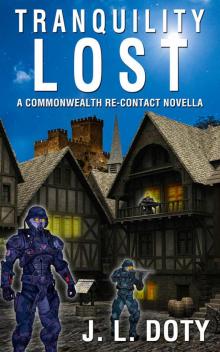 Tranquility Lost
Tranquility Lost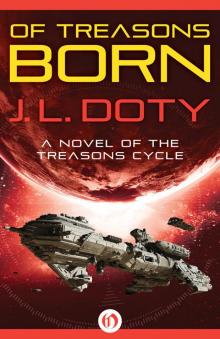 Of Treasons Born
Of Treasons Born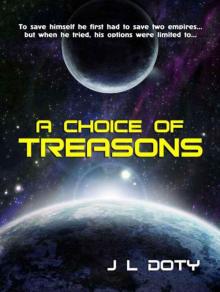 A Choice of Treasons
A Choice of Treasons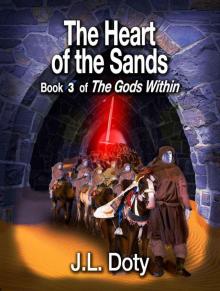 The Heart of the Sands, Book 3 of The Gods Within
The Heart of the Sands, Book 3 of The Gods Within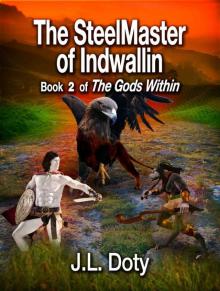 The SteelMaster of Indwallin, Book 2 of The Gods Within
The SteelMaster of Indwallin, Book 2 of The Gods Within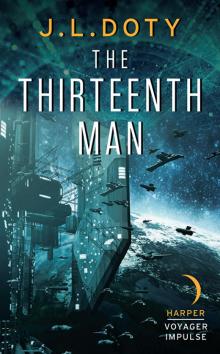 The Thirteenth Man
The Thirteenth Man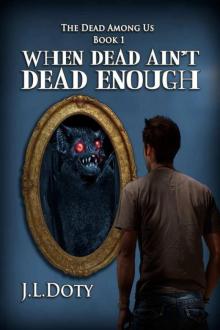 J.L. Doty - Dead Among Us 01 - When Dead Ain’t Dead Enough
J.L. Doty - Dead Among Us 01 - When Dead Ain’t Dead Enough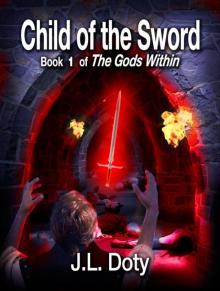 Child of the Sword
Child of the Sword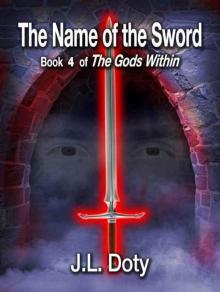 The Name Of The Sword (Book 4)
The Name Of The Sword (Book 4)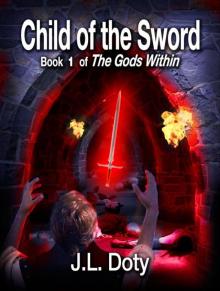 Child of the Sword, Book 1 of The Gods Within
Child of the Sword, Book 1 of The Gods Within